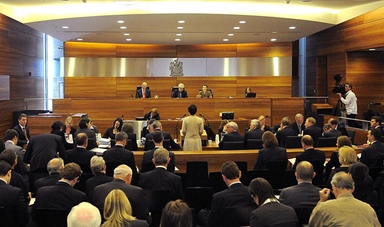Loading component...
At a glance
- The Australian Federal Government has conducted 135 royal commissions since 1902.
- Royal commissions have played a role in unearthing organised crime, corruption and incompetence.
- Recent royal commissions have focused on difficult social issues and are seen as an arm of government policy.
- Royal commissions can shine light on complex problems and drive governments to bring about change.
The 135 Australian Federal Government royal commissions held since 1902 have used their coercive powers to shine a light into dark corners of corruption and incompetence, revealing what led to disasters or encouraged organised crime.
In recent years, however, royal commissions have often focused on difficult social issues, and they are now seen as an arm of government policy.
When a problem is so intractable and the solutions seen as insurmountable, the attention of a royal commission can provide governments with the impetus to push through change.
In 2019, Kylie Kilgour, a senior public servant in Victoria’s Department of Justice, was appointed CEO of the Royal Commission into the Management of Police Informants in Victoria.
Kilgour has been involved in other royal commissions, including one focusing on family violence and says she has worked around family violence throughout her career, but it took a royal commission to show this was the top criminal issue in Victoria.
Royal commissions put a focus on complex issues that have been hidden, that no one wants to talk about, she told CPA Australia’s Victorian division.
The issues are often widely known about and solutions have been proposed, but governments have to swing public opinion in favour of action.
People involved in the aged-care sector have not been surprised by many of the heartbreaking stories of elder neglect emerging from the Royal Commission into Aged Care Quality and Safety, says Luke Bo’Sher, CEO of the Summer Foundation, which works to help young people with a disability from having to live in nursing homes.
“We have known some of the solutions, but it has been difficult to get the traction to implement them,” he says.
Bo’Sher says people in aged or disability care can be frightened to speak to regular government inquiries, but the weight of a royal commission, and the public attention it receives, encourages them to participate because “this won’t be just another report that sits on the shelf”.
Kilgour’s advice for organisations and interested parties to a royal commission is to engage with the subject matter, “travelling along” with the commission and thinking about how they will be positioned to respond when the final report is released.
Royal commissions have the power to order witnesses to appear, or to produce documents, but do they achieve anything?
In 2009, Susan Pascoe was appointed one of three commissioners for the royal commission into the bushfires in Victoria that killed 173 people.
That commission discovered that the system in place to warn residents of bushfire risk wasn’t working, and some people had a false sense of confidence and security. The warning system was subsequently overhauled and is now more explicit about the need to leave home and the consequences of staying.
Pascoe says extensive powers enable commissions to probe “in an exhaustive fashion”.
They are seen to be above politics and draw considerable media attention.
“You can genuinely look at the best policy resourcing outcomes without having the government of the day getting squeamish about budgets or the opposition using them for point scoring,” Pascoe says.
The Royal Commission into Misconduct in the Banking, Superannuation and Financial Services Industry excoriated major banks and other financial services providers and the regulators, leading to high-level resignations even before its final report was delivered in February 2019.
At least two chairmen and two CEOs have gone, and there have been public apologies, shattered reputations, threats of criminal prosecution and predictions of an impact on the housing market because banks are more cautious about lending.
The federal government had opposed holding a royal commission, but was forced to reverse its position after a revolt within the ranks. Prime Minister Scott Morrison was federal treasurer when the commission was called. As he campaigned in the 2019 election, his opponents reminded the electorate that he had been opposed to the inquiry, which goes to show that governments that propose royal commissions should be careful what they start.
Facts about royal commissions
- They can be held at state or federal level and are the highest form of government inquiry.
- The first one, in 1902, inquired into a transport of troops returning from the Second Boer War in South Africa in conditions so bad there was a public outcry.
- There have been two commissions into the failure of bridges and two into taxation. Rural industry is also popular, with commissions into butter, sugar (three), tobacco, fruit, meat (two) and timber.

